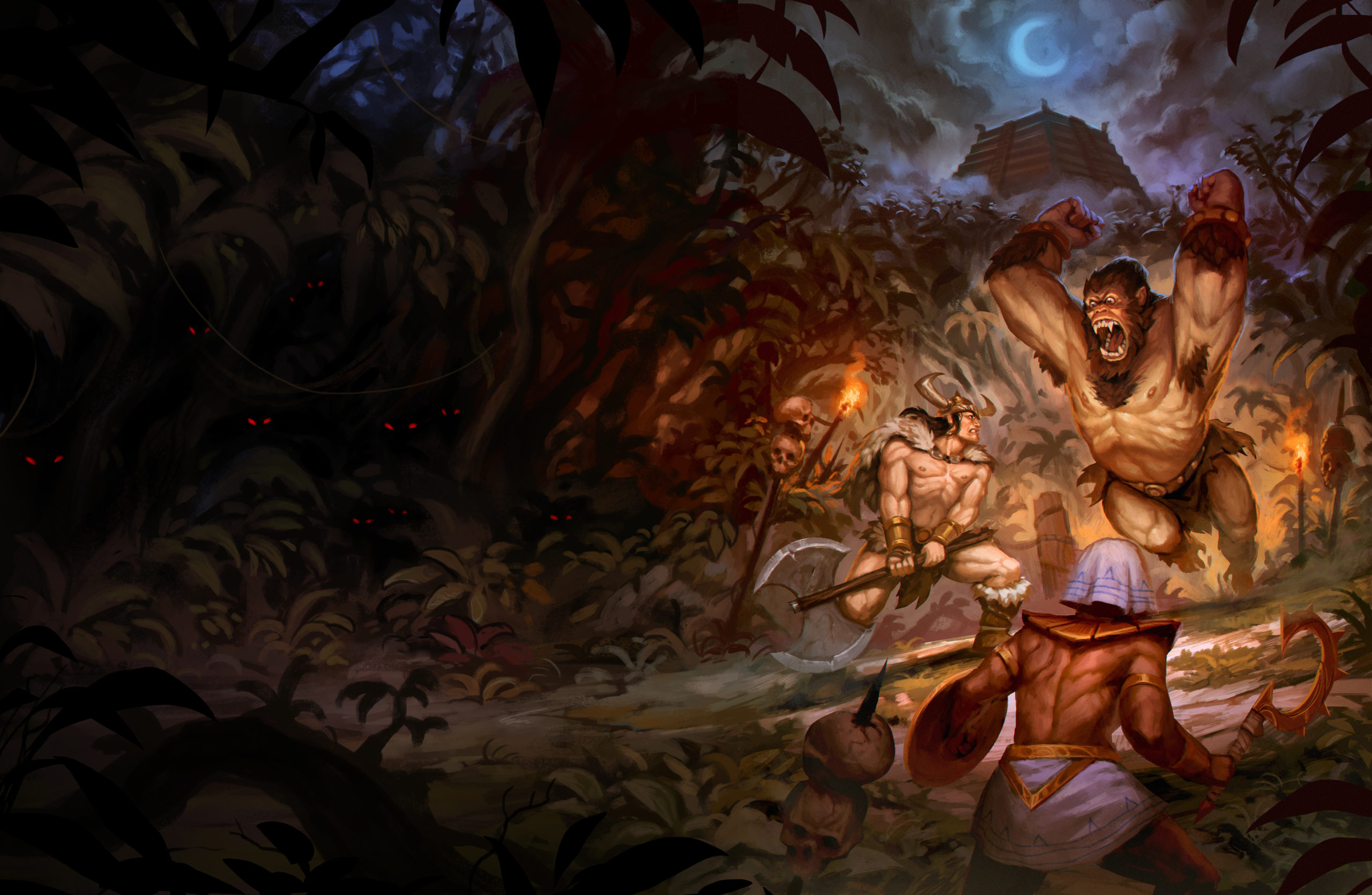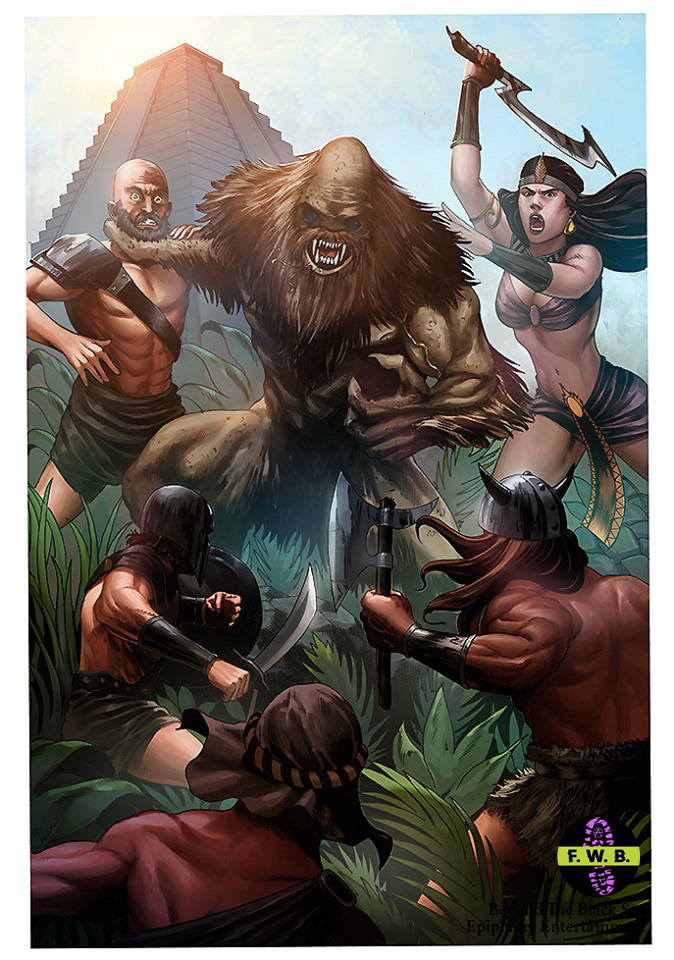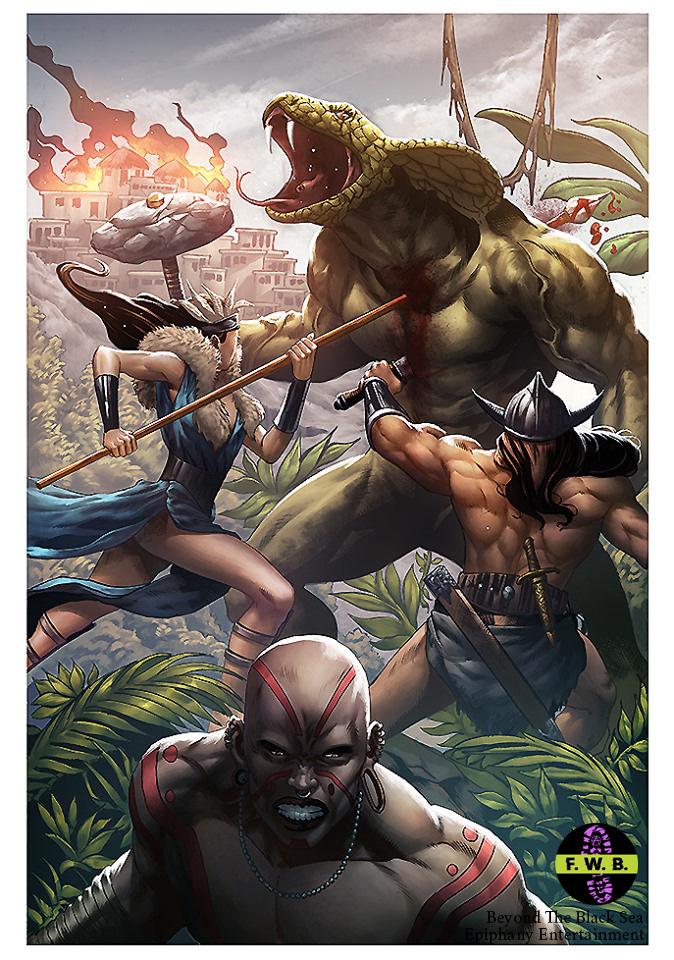
The Sword and Sorcery Genre
Sword and sorcery has been a mainstay of the fantasy genre since… well, pretty much forever. Part of the reason for that is that it lends itself so well to the common trends and tropes that fantasy readers are used to, and in many ways it cuts right to the heart of what makes fantasy so great in the first place.
But what exactly is sword and sorcery? Well, as a general rule, the term is used to refer to the sub-genre of fantasy in which physical combat and magic play a defining role in the story. If the main character is a club-wielding barbarian and he has a wily magician friend who’s skilled in the arts of battle magic, it’s a good sign that you’re reading sword and sorcery.
Of course, there are elements of this in other types of fantasy, from grimdark and high fantasy to YA and even science fiction/fantasy hybrids. The difference tends to be that with sword and sorcery, a much higher emphasis is placed on the battles and the magic as opposed to politics or wider questions of society and morality.
In some circles, even this isn’t enough of a definition, and there are plenty of works out there that blur the boundaries between sword and sorcery and other genres. That’s why in today’s article, we’ll be clearing up a little confusion around the genre of sword and sorcery while giving you a few pointers of where to look if you want to dip your sandaled toes into the genre.
The Origins of Sword and Sorcery
Ever since its early days, sword and sorcery has been characterised by its fast-paced action and its fantastic, mythological framework. It differs from epic fantasy like Lord of the Rings in that in sword and sorcery, we’re usually following the fate of an individual as opposed to the fate of the world. In the Conan books, we follow the Cimmerian as he tries to regain his throne. In the Lord of the Rings, we follow a fellowship as it attempts to save Middle Earth. There’s a big – and important – difference.
The genre itself evolved from a mixture of Greek and Roman legends and the tales of epic bravery told by many Victorian writers, such as The Three Musketeers by Alexander Dumas and even the Brigadier Gerard tales by Sir Arthur Conan Doyle. And both Robert E. Howard and Clark Ashton Smith were said to have been inspired by the Arabian Nights.
Its early origins go hand-in-hand with the history of pulp magazines, which were the historical equivalents of blogs and fanzines. Printed cheaply on low-quality paper, pulp magazines helped counterculture authors to buck the literary mainstream. This helped sword and sorcery to develop as a niche genre, and it also helped to establish the success of other trends like the weird fiction movement spearheaded by H. G. Wells.
One of the interesting things about sword and sorcery is how often its characters inhabit morally grey areas. This is important, because it makes them much more fully-rounded and believable than some goody-two-shoes protagonist who never puts a step wrong. It also makes them more realistic.
In The Worm Ouroboros, which is named after the Greek symbol of a snake eating its own tail to represent infinity, E. R. Eddison’s flawed heroes echo the real-life figure of Alexander the Great, who wept when he realised that he had no more lands to conquer. Eddison investigates the nature of infinity by having the gods restore the heroes’ enemies so that they can endlessly fight the same war over and over again.

Key Figures of Sword and Sorcery
You can’t talk about sword and sorcery without talking about Robard E. Howard. Howard is something of a tragic figure who committed suicide at the age of 30 and who experienced his greatest commercial success after his death. During his lifetime, most of his work was published in the pulp magazine Weird Tales. His first published novel, A Gent from Bear Creek, came out the year after his death. His most famous characters are Conan the Barbarian and Kull the Conqueror.
Even the name “sword and sorcery” relates back to Howard, after authors Fritz Leiber and Michael Moorcock corresponded by letter in the pages of a science fiction fanzine to identify possible names for the genre of fantasy that Howard’s work characterises. This makes Howard’s work so archetypal that it doesn’t just fit into the genre – it helps to define it.
Another key figure is Gary Gygax, although he has a claim to fame that goes above and beyond his (actually not too bad) sword and sorcery novels. Gygax is the creator of Dungeons and Dragons, the iconic role-playing game, and there’s an argument to be made that most D&D campaigns can be classed as sword and sorcery too, as far as a game can have its genre compared to a style of literature.
Dungeons and Dragons gave birth to its own expanded universe called Forgotten Realms in which a number of interlinked stories are all set in the same world. If you ever played the Baldur’s Gate and Icewind Dale video games, you’ve experienced the Forgotten Realms. One of the most well-known Forgotten Realms authors is R. A. Salvatore, and indeed he made his name with it before going on to achieve critical acclaim in his own right.
The genre has even been parodied, perhaps most notably by Terry Pratchett in his Discworld series with Cohen the Barbarian. Pratchett took the idea of these muscle-bound, thick-skulled warriors and asked the question of what would happen when they started to get older. The result? A stereotypical sword and sorcery hero, except he’s also an old-age pensioner who likes his home comforts.
And we’ve still only scratched the surface! Other key sword and sorcery authors include:
- L. Moore
- Charles Saunders
- Clark Ashton Smith
- Darrell Schweitzer
- R. Eddison
- Edgar Rice Burroughs
- Fritz Leiber
- Gardner Fox
- Gary Gygax
- Gene Wolfe
- Joe Abercrombie
- Karl Edward Wagner
- Sprague de Camp
- Leigh Brackett
- Michael Moorcock
- A. Salvatore
- Robert E. Howard
- Robert Lynn Asprin
- Samuel R. Delany
- Scott Lynch
- Stephen R. Donaldson
- Steven Erikson
- Tanith Lee
- Terry Pratchett (sort of but not really, though he’s heavily influenced by it)
You’ll notice that several of these authors are also known for writing science fiction, as well as other genres. Science fiction and fantasy go hand-in-hand, and we’ll be taking a closer look at how science fiction has influenced sword and sorcery in a future article.
Sword and Sorcery’s Impact on Popular Culture
Despite being seen by many as a cult genre, sword and sorcery has had a huge impact on the field of literature and indeed on popular culture as a whole. It’s gone from being a niche interest for geeks and nerds to being something that the mainstream can laugh and joke about. You just have to look at the recent (ish) Conan remake to see that there’s a demand for it.
It’s also interesting to see how the genre has evolved over time to reflect wider societal concerns. Sure, there’s the stereotype of the buxom female protagonist who’s scantily clad in battle armour, but there are also some truly thoughtful takes on feminist sword and sorcery. Girls can kick butt in battle too, and there’s also a rising generation of female sword and sorcery authors who are boosting the genre today like Ursula Le Guin did for feminist science fiction back in the 70s.
The genre has even led to several spinoff genres, most notably Chinese wuxia. Meaning “martial heroes” in English, Wuxia is sword and sorcery mixed with martial arts, like if Conan was a kickboxer. The genre has taken on such popularity that it’s spread throughout the world amongst Chinese-speakers, and now there are even wuxia inspired video games. What’s interesting is that the protagonists are often called “swordsmen” even if they don’t actually wield a sword.
Unfortunately, there’s also a risk that sword and sorcery will become a self-parody. During the boom of the eighties, novelists and film-makers rushed to the genre in the hope of attaining commercial success. Unfortunately, not everything to come out of this period was worth reading – or watching. Because of that, sword and sorcery fell out of favour again.
The challenge for modern writers has been to work against the clichés and the public perception and to breathe fresh air into the genre. Fortunately for us, the readers, there’s a new breed of sword and sorcery writers as well as revised interest from across the board. There might not be many people out there who only write sword and sorcery, but there are plenty who dabble with it alongside other genres.
With that said, there are few modern authors who work exclusively with sword and sorcery. Instead, today’s fantasy writers are like chefs who mix different ingredients together to create new dishes. Sword and sorcery is a spice and just like any spice, it can form the basis of a dish but it can also be overused.
Which brings us to the present day, where sword and sorcery has evolved and been incorporated into so-called “grimdark” fantasy, of which George R. R. Martin’s A Song of Ice and Fire is arguably the best example. Grimdark fantasy mixes sword and sorcery aspects with elements of high and epic fantasy to create something “darker” and “grimmer”.
This is sword and sorcery growing up. The end of the boom of the eighties was marked by sword and sorcery dumbing down and being repackaged into kids TV shows and cartoons. Its resurgence in the new millennium is accompanying a shift towards darker, more grown-up sword and sorcery. The genre has finally come of age.
What’s Next for Sword and Sorcery?
Some SFF pundits think that sword and sorcery is dead, or at the very least that it’s no longer relevant. These are the same people who use the term in a derogatory manner, as if to suggest that their taste in literary genres is somehow objectively better than everyone else’s.
This elitist approach isn’t good for anyone, but it’s also a shame because it can put readers off the genre before they even get a chance to explore it. Come to think of it, half of the critics haven’t explored it either, or at the very least they haven’t read a sword and sorcery novel that was published in the last ten years.
With that said, it’s certainly true that sword and sorcery witnessed a decline in the 1990s and 2000s after the hype and the heights of the 80s, which were helped out by Arnold Schwarzenegger’s Conan films. Arnie also starred opposite Brigitte Nielsen in Red Sonja, another movie based upon a Robert E. Howard character.
But the genre has been experiencing another resurgence in recent years, perhaps partly because of the success of Game of Thrones. True, neither George R. R. Martin’s A Song of Ice and Fire series nor the TV show that was based upon it can be classified as sword and sorcery, but fantasy is an ecosystem and if one subgenre does well, they normally all do.
There are also plenty of talented contemporary authors who are working to push the genre to new heights, whether that’s by experimenting by mixing it with new genres or whether they’re creating new stories that will endure for generations to come. People have been forecasting the death of science fiction and fantasy for as long as they’ve been popular, and they haven’t been right so far.
For our part, we think sword and sorcery will continue to be at least as popular in the years to come as it is today, if only because we live in trying times and people are looking for a distraction. In a world in which we’re under attack by pandemics that we can’t see and where nine different countries have access to nuclear weapons, it’s weirdly reassuring to read about a guy with a sword fighting a bad-tempered giant.
The future of sword and sorcery is looking bright indeed. Now, who’s ready to head off on an adventure?

Article Written by Dane Cobain for Epiphany Entertainment
Copyright ©Epiphany Entertainment 2020